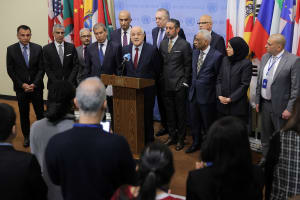An attempt to assess the recent Israeli elections
Has Bibi's power been shaken? And what does this new – Arab – kingmaker mean for Israel?
It is always a bit of a challenge to explain to friends and supporters of Israel around the world what exactly is happening in Israeli politics. Just days after holding our fourth national elections in less than two years, this challenge is more complex than ever.
Perhaps the easiest way to explain why it has been so difficult to create a stable government over the last couple of years, is to put it this way: Slightly less than half of the Israeli population thinks that Binyamin “Bibi” Netanyahu should continue as prime minister while slightly more than half adamantly believes Bibi should no longer be our prime minister, but cannot really agree on anything else.
For this reason, the anti-Bibi camp currently consists of eight political parties (out of 13 currently serving in our Knesset) supporting a handful of other candidates who purport to be worthy of serving as our prime minister.
What everybody knows without a doubt is that Bibi’s shoes are quite large, and will be difficult for anyone else to fill. The particular characteristic of Bibi, which seems to elude every other candidate, is his experience, expertise and uncanny ability to convincingly present our case in the international arena. Probably for this reason, more non-Israeli supporters of Israel love Bibi than Israelis who do. To borrow from the words of Jesus, “no prophet is accepted in his hometown” (Luke 4:16-30).
This conundrum has caused our political system to get stuck for years in a reoccurring loop of national elections.
On the backdrop of the above generalities, I would like to point out a couple of interesting developments that emerged from these last elections.
1. The Concept of Bibi as the Master Elections Winner has Been Shaken
The government of Israel has been dominated by the right wing, and largely by Bibi’s Likud party, for all of the last 20 years, and the percentage of Israelis voting for rightist parties has been consistently growing over the same period. Based on these last elections, around 75% of Israelis voted for a right-wing party. Bibi has generally received the credit for these phenomena, but now it appears that he is becoming more of a liability than an asset to the rightist agenda.
If the anti-Bibi camp succeeds over the next few weeks in forming a government, it will most likely include the central-left Yesh Atid party, the leftist Labor party and the ultra-leftist Meretz. This will be a bitter pill to swallow for right-wing voters.
I would estimate, based on these last elections, that if someone else had been campaigning as chairman of the Likud, they would have received more votes, and a strong right-wing government would have been assembled quite quickly. In fact, should Bibi resign from politics today (which is highly unlikely), and someone else takes the helm of Likud, a broad, stable government would be formed very easily, and the seemingly-indefinite cycle of new elections would be over.
2. A New Kingmaker has Emerged from Unlikely Quarters
For most of Israel’s modern history, the swing vote necessary to form our coalition governments has belonged to the ultra-religious “Haredi” parties. For many years, they were willing to join either a right-wing or left-wing government, just as long as they were included at the decision-making table. This reality has typically gained them more political power than their representative numbers among Israel’s population, simply because with the ultra-religious parties we have a government and without them, we do not.
The Muslim Brotherhood-backed Ra’am Party, led by its charismatic leader Mansour Abbas, apparently learned a lesson from the ultra-religious Jewish parties, and – in an effort to bring the Arab-Israeli voice to the decision-making table for the first time in Israel’s history – has assumed the position of the swing vote. In these last elections, Abbas has declared that he will support either a pro-Bibi or anti-Bibi coalition, depending upon how much either side is willing to offer to his constituency. Apparently, with his support, a government will be formed, and without his support, it will not.
The importance of this development should not be underestimated. All Arab parties in Israel have largely been wandering on the back side of the desert in virtual political isolation, since the Israeli Knesset was established in 1948, completely devoid of any real decision-making ability.
Ra’am, which is actually an acronym for the “joint Arab list”, literally means “thunder” in Hebrew, a fact not lost on me. The emergence of Abbas as kingmaker has surprised our political system like thunder on a clear day.
Personally, I am somewhat thrilled by this development – and somewhat disturbed.
The fact that a large constituency of Israeli Arabs voted for Ra’am makes a statement that they want to be more a part of mainstream Israeli society. That is exciting. As our President Reuven Rivlin once said regarding Jews and Arabs in Israel, “We have not been doomed to live together. We have been destined to live together.”
Our Arab minorities should be viewed by the Zionist camp as a fully-integrated valuable asset, rather than a ticking demographic time bomb. This is certainly what the fathers of Zionism thought. To quote Ze’ev Jabotinsky, “In every cabinet where the prime minister is a Jew, the vice-premiership shall be offered to an Arab and vice versa.”
Having said that, it is very difficult to ascertain to what extent Abbas is directed, or even significantly affected, by the anti-Western and anti-democratic ideologies of the Muslim Brotherhood. The southern faction of the Islamic Movement appears to be the most dominant force in the Ra’am party. What actual effect does this have on their policies, and to what extent will this affect future decisions of the Israeli government?
Only time will tell.
In short, it looks like someone other than Bibi will probably form and lead our next government as prime minister, but at present it is very difficult to foresee exactly who that will be.
In any case, the identity of such person will be affected to a certain extent, for the first time in Israel’s history, by its Arab minorities.

Calev Myers is the Founder and Chairman of ARISE - Alliance to Reinforce Israel's Security and Economy, a non-profit organization dedicated to connecting international business networks to the economy of Israel. He is also a Senior Partner at Yehuda Raveh & Co. Law Offices. Calev and his wife Sheli, together with their five children, happily reside in the Judean Hills on the outskirts of Jerusalem.













